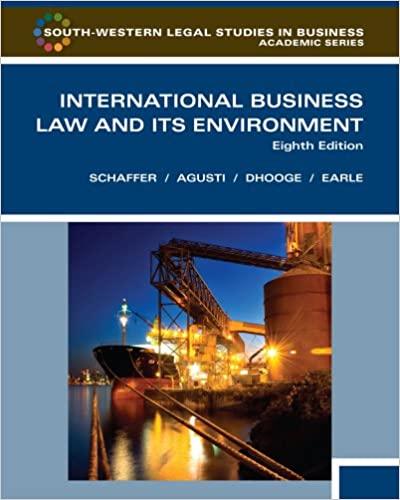Question
QUESTIONS 11-20 :NAME THAT RIGHT or PROVISION (Assume Preferred Stockholders = VCs) A Participation Rights (e.g., fully participating preferred stock) G NVCA's Typical weighted average
QUESTIONS 11-20:NAME THAT "RIGHT" or "PROVISION"
(Assume Preferred Stockholders = VCs)
| A | Participation Rights (e.g., "fully participating" preferred stock) | G | NVCA's Typical weighted average anti-dilution provisions | |
| B | Information Rights | H | Conversion Right | |
| C | Redemption Right (assume "put right") | I | Liquidation Preference | |
| D | Pay-to-Play Provisions | J | Co-Sale Right | |
| E | Drag-Along Right | K | Registration Rights | |
| F | Right to Participate Pro Rata in Future Rounds | X | Repurchase Option (or vesting provisions) |
| QUESTION | RIGHT | DESCRIPTION |
Example | X | Makes a founder's Common Stock "sticky" |
11 | Also called a "take-me-along" or "tag-along" right (it allows Preferred Stockholders to "join in" on certain sales of stock by a founder to a third party) | |
12 | Requires stockholders to vote in favor of certain sales of the company that are approved by the board of directors and a certain percentage of the Preferred Stockholders | |
13 | CP2 = CP1 * (A+B) / (A+C) | |
14 | Provides that upon a liquidation (which may include the sale of the company) the Preferred Stockholders must be paid a certain amount of the proceeds before the Common Stockholders can receive any proceeds | |
15 | Entitles Preferred Stockholders to receive a pro rata share of what remains as though their Preferred Stock had converted to common stock (after any liquidation preference is paid by the liquidating company) | |
16 | Requires a company's existing investors to also invest in a later financing or lose certain rights (e.g., investor X's Preferred Stock will automatically convert to Common Stock if X does not invest in a subsequent financing) | |
17 | Requires the company to repurchase its own stock at some point in the future from Preferred Stockholders choosing to exercise this right | |
18 | Entitles Preferred Stockholders to exchange their Preferred Stock for shares of Common Stock | |
19 | Allows Preferred Stockholders (often just "Major Investors") the right to purchase their share of future issuances of stock by the company | |
20 | Defines rights Preferred Stockholders have to force the company to register their shares with the Securities and Exchange Commission so that it can be sold in public markets |
Step by Step Solution
There are 3 Steps involved in it
Step: 1

Get Instant Access to Expert-Tailored Solutions
See step-by-step solutions with expert insights and AI powered tools for academic success
Step: 2

Step: 3

Ace Your Homework with AI
Get the answers you need in no time with our AI-driven, step-by-step assistance
Get Started


